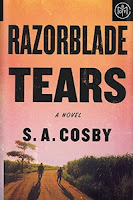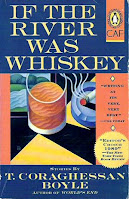This year, I forgot how many good things I'd read until I looked back on my list. I set no records for volume but thoroughly enjoyed several books.
Best of the Year: History
Shadow Divers; The True Adventure of Two Americans who Risked Everything to Solve one of the Last Mysteries of WW II, Robert Kurson, 2004
 My colleague John Beck lent me this book. He and his sons share an interest in World War II. When he first shared it with me, I wrestled with a little resentment: You don't get to put a book on my already-too-long to-read list! I'm not a WW II nut! It took very little time once I'd started reading it to understand why someone would evangelize for this gripping tale. Kurson (with whom I was unfamiliar) draws the reader into this history extremely effectively. A group of experienced shipwreck divers pursue a tip that there seems to be something in the water 60 miles off New Jersey in the early 1990s. They discover something from World War II (no spoilers; it's in the subtitle). Shadow Divers tells the story of their dives, their research, their rabbit trails and red herrings, and the risk that is an inextricable part of diving shipwrecks. The pages fly by. I read the final 60 pages in essentially one sitting. The story rewards immersion. Not that it makes me want to do the literally death-defying things that these guys did in their efforts to solve this mystery. Although I have experienced being gripped by some passion or interest, I can't imaging going to the depths that these guys did.
My colleague John Beck lent me this book. He and his sons share an interest in World War II. When he first shared it with me, I wrestled with a little resentment: You don't get to put a book on my already-too-long to-read list! I'm not a WW II nut! It took very little time once I'd started reading it to understand why someone would evangelize for this gripping tale. Kurson (with whom I was unfamiliar) draws the reader into this history extremely effectively. A group of experienced shipwreck divers pursue a tip that there seems to be something in the water 60 miles off New Jersey in the early 1990s. They discover something from World War II (no spoilers; it's in the subtitle). Shadow Divers tells the story of their dives, their research, their rabbit trails and red herrings, and the risk that is an inextricable part of diving shipwrecks. The pages fly by. I read the final 60 pages in essentially one sitting. The story rewards immersion. Not that it makes me want to do the literally death-defying things that these guys did in their efforts to solve this mystery. Although I have experienced being gripped by some passion or interest, I can't imaging going to the depths that these guys did.
Benjamin Franklin, Edmund Morgan, 2002
This book parked under my nightstand for a long time after being - I believe - a Christmas present from my father. I read it as part of my resolution to read all of the books in that under-nightstand stack before bringing new books into the house. At that, it was in the second half of that stack, and I wasn't totally psyched to start it. But I was wrong. Morgan writes a brisk life of a man who left lots of writing behind that captures his extraordinary intellect and public service. It's hard to imagine America coming to be without Franklin deploying his intelligence in the colonies, in England, and in France, where he secured funding for the emerging country between the Declaration of Independence and the Constitution. A polymath, Franklin is known for his contributions to the science around electricity, but he had his hand in other things, too, like advances in ship technology, and charting the gulf stream. He lived in a tension between science and public affairs. We can't know what he might have done had he dedicated himself to science, but we can be grateful that he didn't. Between personally moving between different groups of people in Europe and in the New World and writing his own essays and printing those of others (his main trade was as a Philadelphia printer), Franklin continually did the intellectual and influence work that the emerging country needed. He believed that all governments succeed based on the will of the people to be governed and their satisfaction with the performance of that government. This amounted to a newfangled idea against the monarchic background of colonial times. Poor Paige heard a lot of Franklin fun facts while I raced through this book.
Live from New York; the Complete, Uncensored History of Saturday Night Live as told by its Stars, Writers, and Guests, James Andrew Miller and Tom Shales, 2014
This is one of maybe two books that have been on my to-read list when I found them in a Little, Free Library. That's an amazing feeling when it happens. This is a long (almost 750-page) oral history of SNL by everyone from 1975 to 2014. The authors got access to everyone - happy and unhappy cast members, one-time and perennial guest hosts, writers, NBC execs. It's a fascinating walk through an institution that has evolved continually even as the public and critics have rhythmically pronounced it dead every few years. Everyone falls in love with the generation of the show that's there when they're in high school/college. YouTube now means no one has to be in or stay up late on Saturday night to see the show. The insane production schedule is pretty well known, but it's still revelatory to read about it from several different personal angles. Miller and Shales organize the book in long chapters about each roughly five-year generation of the show. It's interesting to read about the high times and the low times, the large casts, and the small. I took several months reading this huge volume amidst other books. Glad I found it and read it.
Best of the Year: Memoir
Punch Me Up to the Gods, Brian Broome, 2021
The Beautiful Struggle, Ta-Nehisi Coates, 2008
Having read other Coates essays and books and seen him give a lecture, I was excited to find a memoir that I didn't really know about in a Little, Free Library on a neighborhood walk. The Beautiful Struggle is a frank telling of Coates's childhood, including his awkwardness, impulsiveness, and the nurturing (if not perfect) household and community in which he grew up. West Baltimore can be a tough place. Coates tells a nuanced story of his complicated family - his father had - at press time - seven children by four mothers. He was present in Coates's life - maybe more present than young Ta-Nehisi might have wished. His father's principles and beliefs in the strengths of their African heritage after unhappy generations in America both provided his (not-always-profitable) living in the form of a tiny heritage "press" (often no more than saddle-stapling printouts in the basement and dictated how the family spent time. Young Ta-Nehisi oscillated between buying into it all and chafing at the sway his father's ideas held sway over him and the family. The book is full of honest stories about young Ta-Nehisi screwing up and throwing away good opportunities. This almost always provides a moment for adults who see his potential to give him another chance. His peers don't always offer the same forbearance for his faux pas. Reading this book essentially right after Brian Broome's Punch Me Up to the Gods, it's clear that as wild as things occasionally were for the Coates family, there was a safety net of parental intellect and ambition for their kids that generally launched them to the hoped-for mileposts.















